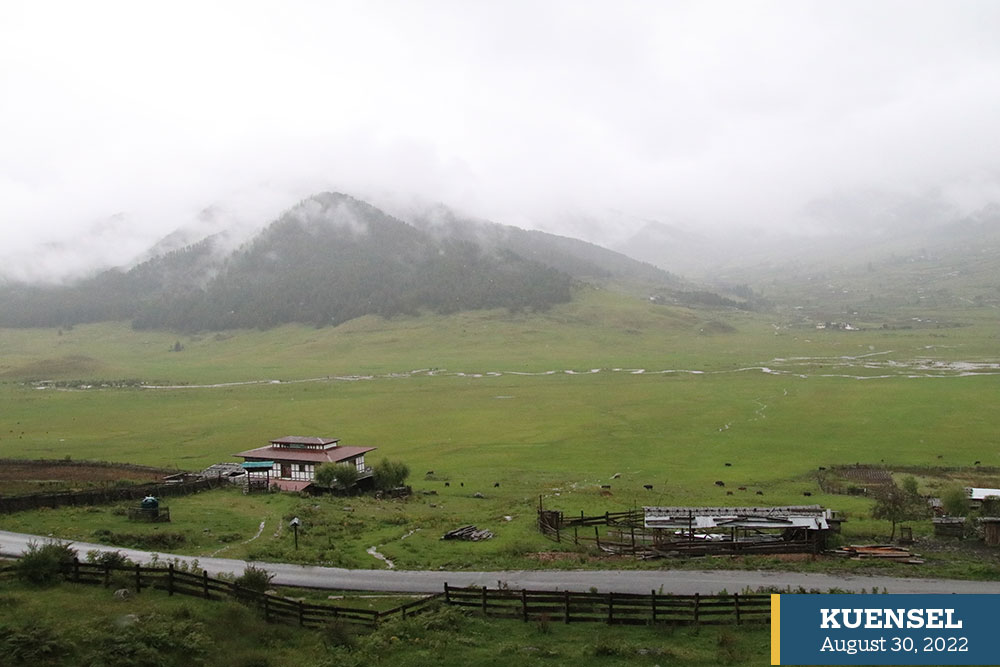RSPN’s act of balancing conservation and livelihood
Chhimi Dema
The Royal Society for Protection of Nature (RSPN) is renowned for successful black-necked crane conservation since its establishment in 1987.
For more than three decades, RSPN has brought an increasing number of wintering cranes with its conservation efforts and included the community in safeguarding the cranes.
Through its community-based sustainable tourism (CBST) programme in Phobjikha, the local community is financially empowered and sees more and better opportunities.
The programme offered packaged facilities which included homestays, local guides, rental bicycles, exploring local culture, nature and farm activities.
Among these, homestays have brought immense changes to their earning opportunities.
Gangtey Gup Kinley Gyaltshen said that RSPN for more than two decades provided the local communities in Phobjikha support in strengthening their livelihoods.
Before home stays were established, RSPN provided the communities with financial support to build toilets and organised training in cooking for the farmers, he said.
“RSPN empowered the communities here by giving the people opportunities to make income from how they lived their lives,” Gup Kinley said.
While making efforts to conserve the black-necked crane thoroughly, RSPN ensured that the community was not left behind, Gup Kinley added. “The skills the people learned years ago are still benefiting them, such as comfortable hospitality to the guests which helps us bring more guests.”
According to the focal agency for managing the Phobjikha Conservation Area, little was known about the cranes in Bhutan before the efforts of Dasho Paljor Jigme Dorji in Phobjikha Valley in 1986.
Recognising the importance of the habitat for wintering cranes, Phobjikha valley was designated as a conservation area in 1999.
RSPN’s national coordinator for black-necked cranes conservation, Jigme Tshering, said that the community’s support and participation were critical for a successful conservation effort. “Acquiring such support entails raising awareness among the community on the importance of conservation and applying crane conducive livelihood options.”
As a first step in engaging the local community, RSPN formed the Gangtey-Phobji Environmental Management Committee and Phobjikha Environmental Management Committee. The group was formed to promote transparent decision-making and implementation process based on community participation and collaborative efforts.
The committee was established to “effectively liaison between the interest of the local communities, government and environmental agencies”, Jigme Tshering said.
The committee currently oversees the waste management system and coordinates the annual crane festival.
The local communities also earn from the yearly crane festival celebrated in Gangtey. People with skills in wood carving, weaving or painting sell their artistic works.
Hotels and homestays are packed during the crane festival.
Passang Tobgay, 36, from Nyemphey, said that during the crane festival his homestay is always booked. “People come to live with us for a few days and the income from that helps to make extra income which can be spent on my children’s education.”
He said: “We don’t have to borrow or loan money to make daily expenses or while renovating our homes.”
RSPN initially provided solar panel to the community before electricity.
An individual from a household with a homestay was trained in housekeeping and cooking continental dishes as well.
Sati, a homestay owner, said that each household got Nu 15,000 to buy blankets and mattresses and make other investments to provide better and hygienic services to the guests.
“To even take out Nu 1,000 from our pockets is difficult for us. So, such support is beneficial,” Sati said.
Running a homestay does not require too much sweat, he said. “We have to ensure that our houses are clean and serve the meals on time.”
The locals are excited to receive guests in September.
Another homestay owner, Tshewang Lhamo, said that an extra income from homestays comes in handy. “We are grateful to RSPN for their support. Their encouragement has made us connect with people from other parts of the country and find means to make extra income.”
Locals charge from Nu 800 to Nu 1,500 for a night including two meals.
“Our children also get more exposure from interacting with other people and they work harder in schools,” Tshewang Lhamo said.
Since RSPN’s effort, records show that crane wintering has doubled from around 300 in the 1990s to about 600 because of increased protective mechanisms, conservation intervention, and improved population monitoring and counting protocols.
There are 545 black-necked cranes (BNC) in the country today. The highest number of BNC is in Phobjikha with 465 cranes, followed by 64 in Bumdeling in Trashiyangtse.
The global black-necked crane population has increased from around 7,000 to 11,000 birds since 1990.
Jigme Tshering said that cranes need fallow or post-harvest farmland as their roosting sites. He said, that the changing attitude of the people seeking development would affect the long-term survival of these birds.
“Local people may feel that crane conservation has limited their economic opportunities and is an obstacle to their future prosperity. To counter this, there is the need to strike a balance between the conservation of the crane’s ecosystem and the use of the local environment for economic development,” Jigme Tshering said.
He added that the CBST programme in Phobjikha provides the right opportunity for RSPN to enhance conservation, improve the economic welfare and promote local community participation.
The story is funded by Bhutan Media Foundation’s civil society reporting grant.


